NOUNS: What is a Noun? Useful Rules, List & Examples
NOUNS: What is a Noun? Useful Rules, List & Examples
English Nouns List! What is a noun? Learn noun definition and useful list of nouns in English with different types. Learn noun examples and handy grammar rules with ESL printable worksheets.
What Is A Noun?
What is a noun? Noun is described as words that refer to a person, place, thing, event, substance, quality, quantity, etc.
Noun is a part of speech typically denoting a person, place, thing, animal or idea.
There are many different types of nouns in English, each designed to serve a different purpose in an English sentence.
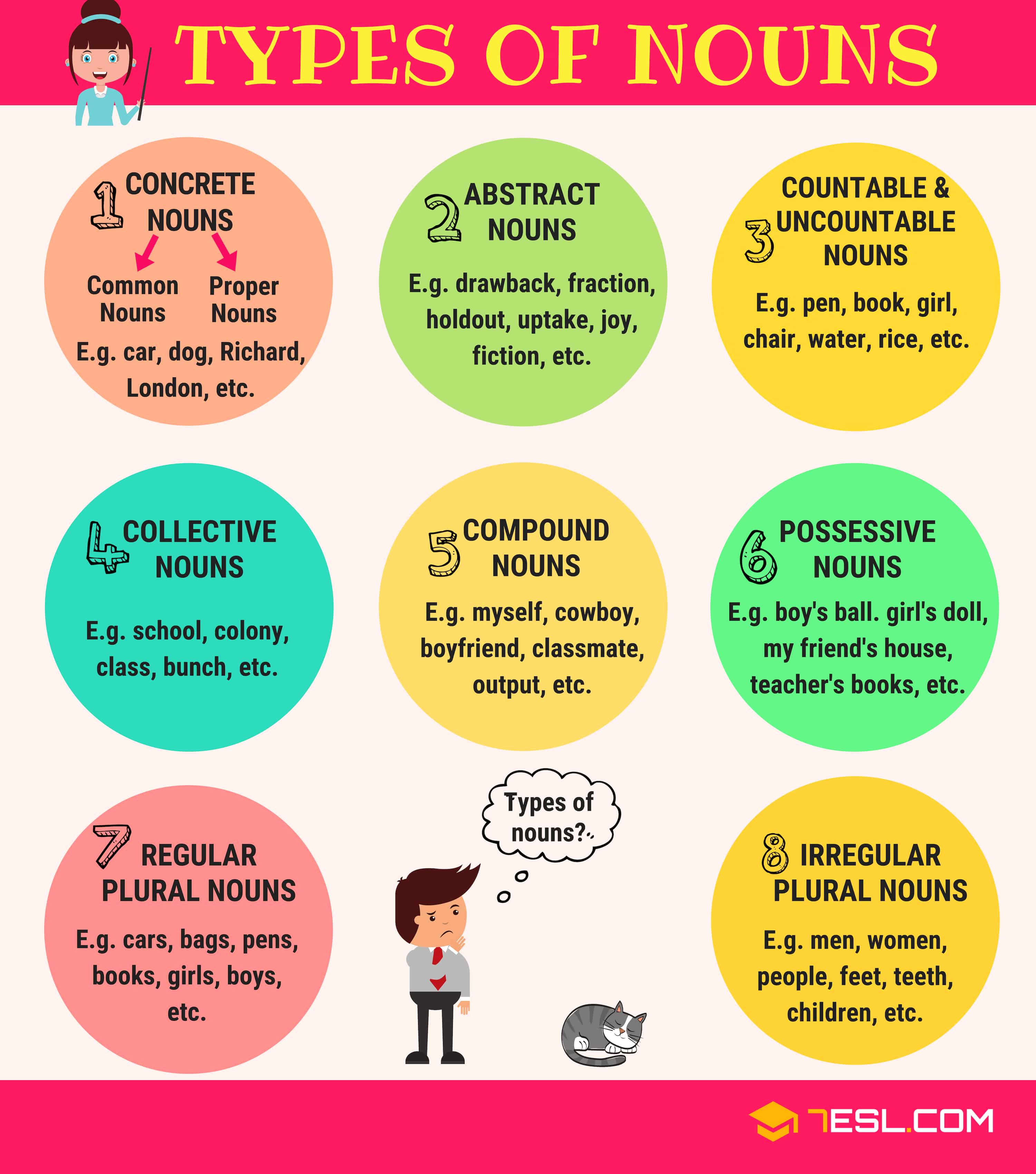
List of Nouns in English with Different Types
Learn useful list of nouns in English with different types and relevant noun examples.
Concrete Nouns
What is a Concrete Noun?
Concrete nouns are people, places, or things that we can experience with our five senses. Concrete nouns can be divided into common nouns and proper nouns.
List of Nouns – Concrete Noun Examples
- Armchair
- Aunt
- Ball
- Bermudas
- Beans
- Balloon
- Bear
- Blouse
- Bed
- Baby
- Book
- Blender
- Bucket
- Bakery
- Bow
- Bridge
- Boat
- Car
- Cow
- Cap
- Cooker
- Cheeks
- Crest
- Chest
- Chair
- Candy
- Cabinet
- Cat
- Coffee
- Charlie
- Dog
- Deer
- Donkey
- Desk
- Desktop
- Dentist
- Drum
- Dresser
- Designer
- Detective
- Frog
- Fan
- Freezer
- Fish
- Film
- Foot
- Flag
- Guest
- Hamburger
- Jewelry
List of Nouns – Concrete Nouns Image
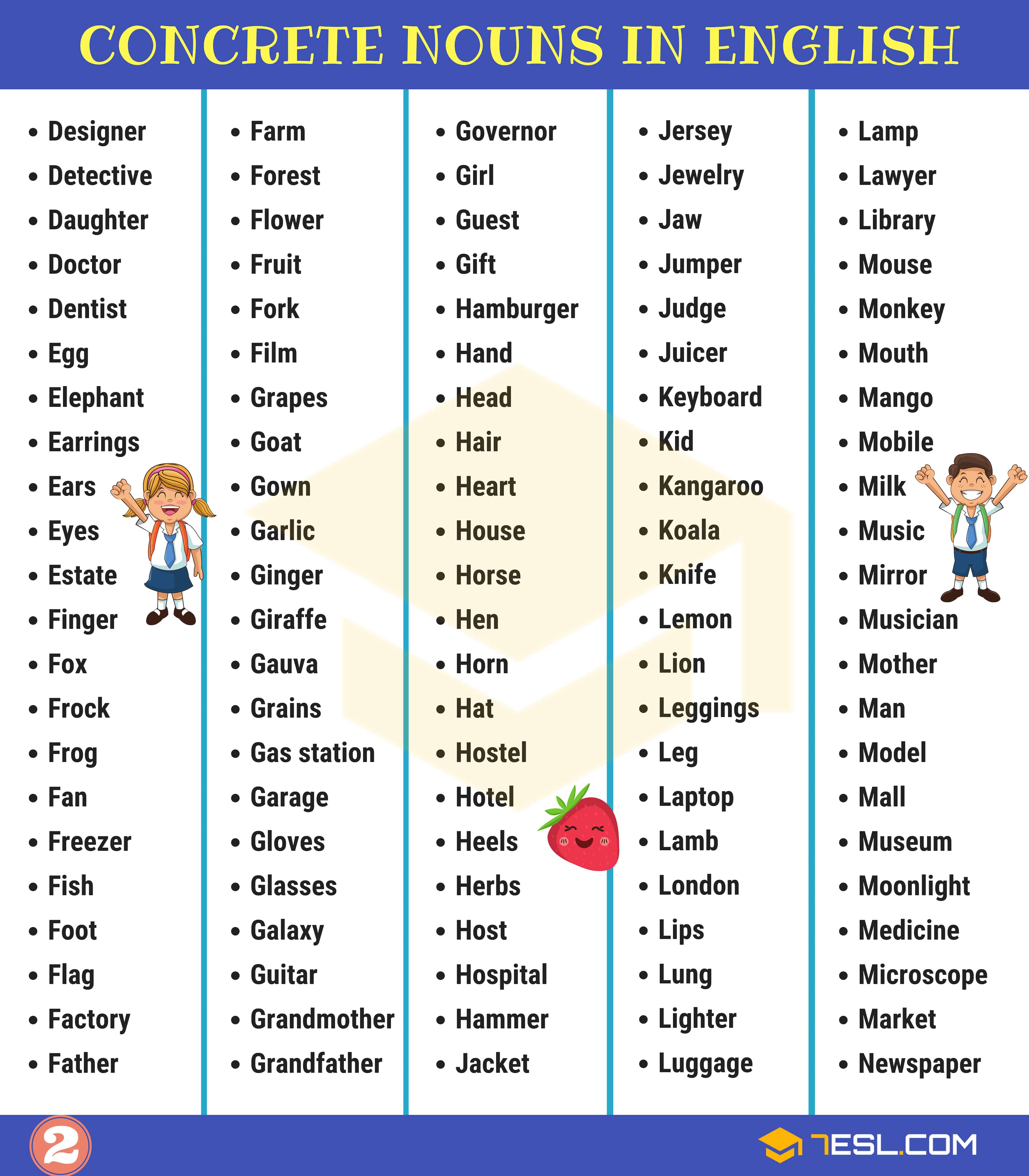
Abstract Nouns
What are Abstract Nouns?
Abstract nouns refer to abstract objects which you cannot see, hear, touch, smell, or taste (ideas or concepts).
List of Nouns – Abstract Noun Examples
- Awareness
- Awe
- Beauty
- Belief
- Childhood
- Clarity
- Cleverness
- Confusion
- Contentment
- Courage
- Crime
- Growth
- Happiness
- Hate
- Hatred
- Inflation
- Insanity
- Intelligence
- Joy
- Justice
- Kindness
- Laughter
- Law
- Liberty
- Love
- Luck
- Luxury
- Maturity
- Need
- Opinion
- Opportunity
- Pain
- Principle
- Reality
- Relaxation
- Sanity
- Satisfaction
- Self-control
- Speed
- Strenght
- Strictness
- Tiredness
- Tolerance
- Trend
- Union
- Unreality
- Victory
- Wariness
- Warmth
- Wealth
List of Nouns – Abstract Nouns Image

Countable and Uncountable Nouns
Countable and Uncountable nouns vary from language to language. In some languages, there are no countable nouns. In addition, some nouns that are uncountable in English may be countable in other languages.

Countable Nouns
Countable nouns are individual objects, people, places, etc. which can be counted.
Countable Noun Examples
- Apple
- School
- Student
- Picture
- House
- Tree
- Box
- Book
- Customer
- Friend
Uncountable Nouns
Uncountable Nouns Definition
Uncountable Nouns are substances, concepts, materials, information… that we cannot divide into separate elements. They can’t be counted.
List of Nouns – Uncountable Nouns List
- Access
- Adulthood
- Alcohol
- Business
- Blood
- Botany
- Bacon
- Chaos
- Clothing
- Confidence
- Compassion
- Calm
- Cotton
- Childhood
- Coffee
- Danger
- Data
- Dancing
- Distribution
- Dirt
- Duty
- Education
- Economics
- Equipment
- Fame
- Freedom
- Glass
- Grass
- Golf
- Hair
- Hardware
- Hydrogen
- Hatred
- Hunger
- Honey
- Importance
- Intelligence
- Industry
- Jealousy
- Jam
- Jewelery
- Innocence
- Iron
- Linguistics
- Light
- Loneliness
- Music
- Meat
- Nurture
- Psychology
NOTE: Some nouns are both countable and uncountable. They have been put in bold.
List of Nouns – Uncountable Noun Examples
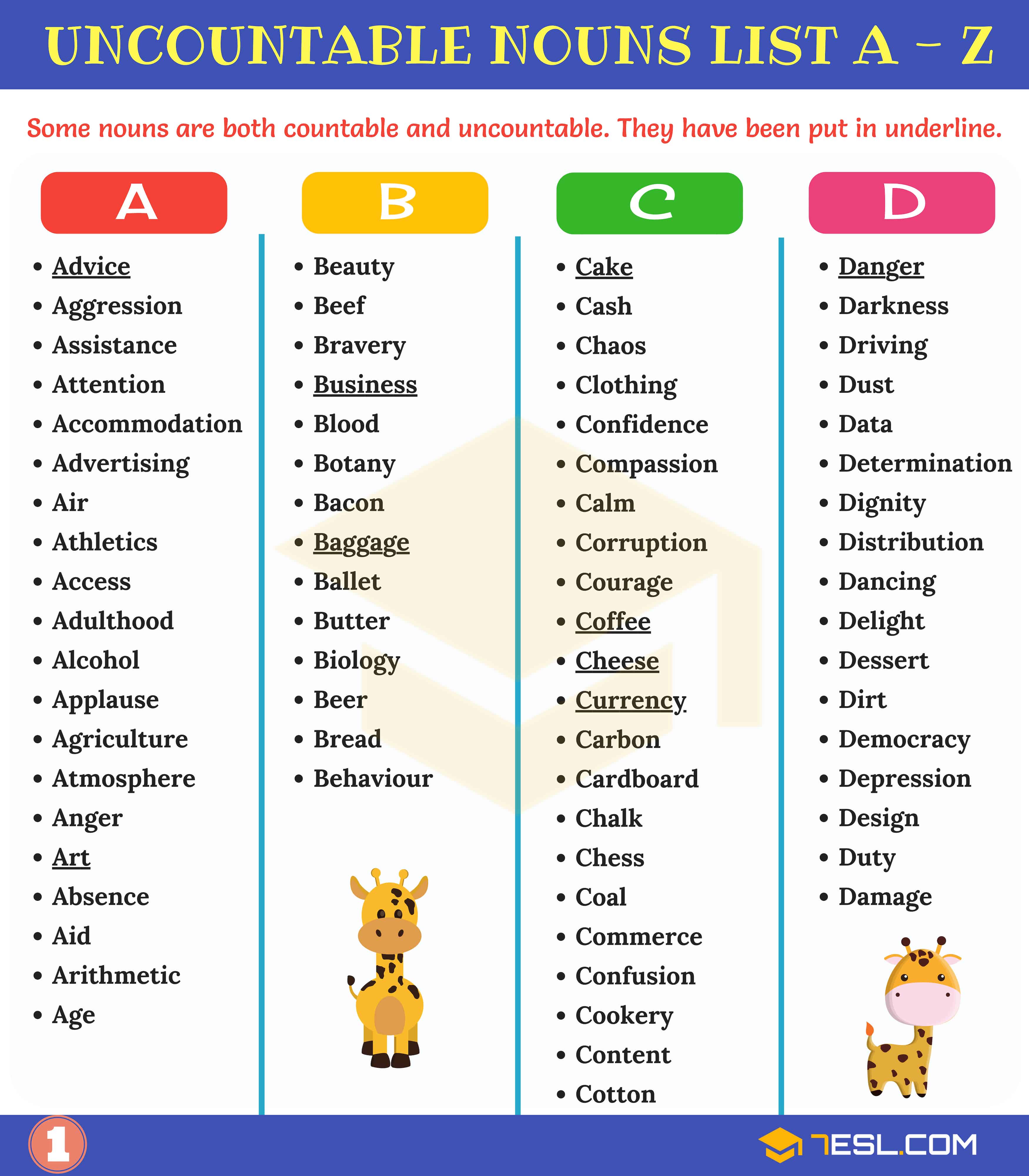
Collective Nouns
What are Collective Nouns?
Collective nouns are names for a collection or a number of people or things. Words like group, herd, and array are collective noun examples.
Collective Noun Examples
- Herd
- Pack
- Flock
- Swarm
- Shoal
- Group
- Crowd
- Gang
- Mob
- Staff
- Crew
- Choir
- Orchestra
- Panel
- Board
- Troupe
- Bunch
- Pile
- Heap
- Set
- Stack
- Series
- Shower
- Fall
List of Nouns – Collective Nouns Image
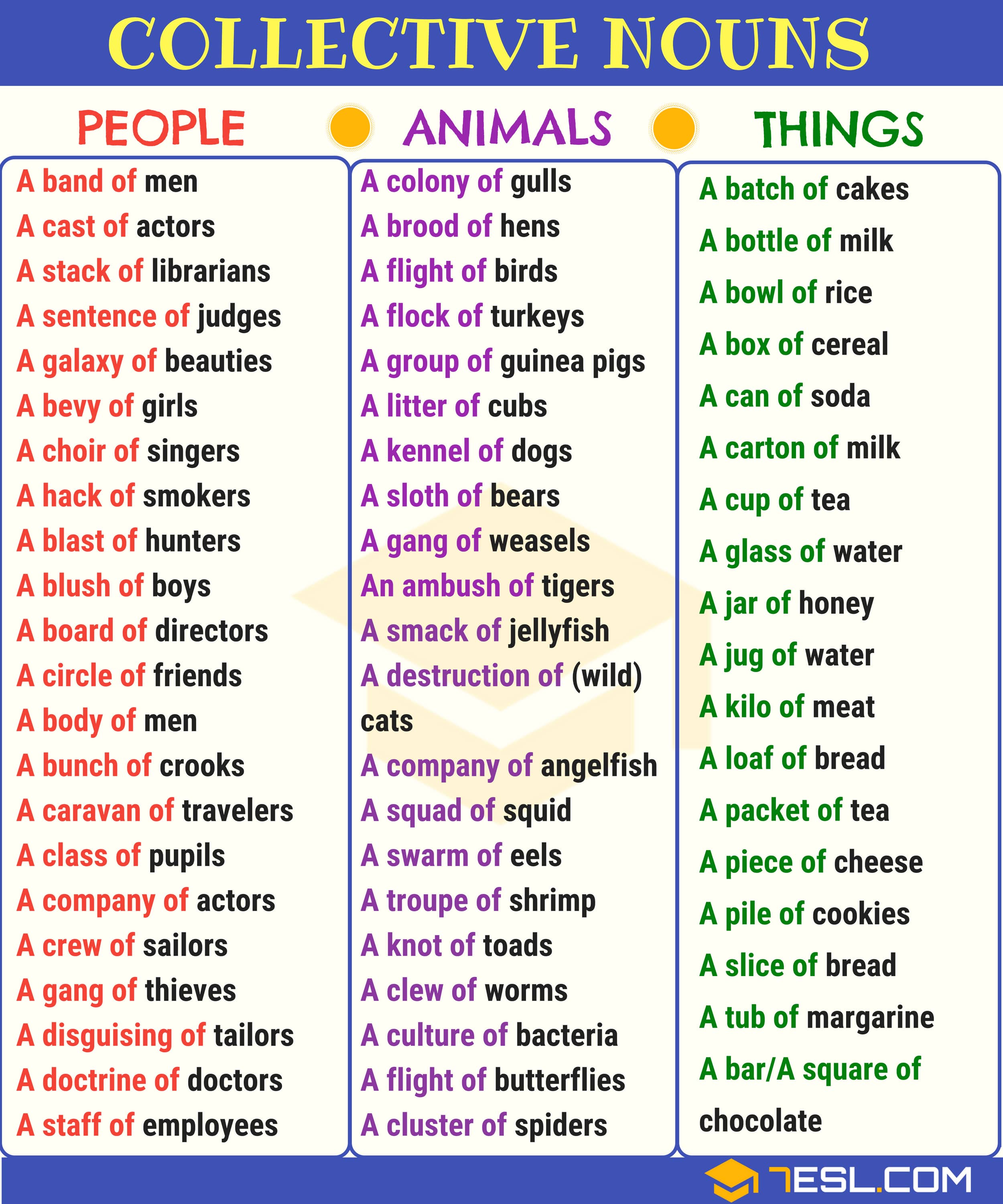
Compound Nouns
Compound Nouns Definition
Compound nouns are words for people, animals, places, things, or ideas, made up of two or more words. Most compound nouns are made with nouns that have been modified by adjectives or other nouns.
List of Nouns – Compound Noun Examples
- Airline
- Airport
- Aircraft
- Armchair
- Boyfriend
- Battlefield
- Briefcase
- Butterfly
- Countdown
- Comeback
- Background
- Cupboard
- Chopstick
- Classmate
- Daredevil
- Daydream
- Dragonfly
- Everybody
- Everything
- Fireworks
- Football
- Footprint
- Greenhouse
- Hallway
- Handcuff
- Haircut
- Homework
- Horsefly
- Houseboat
- Inside
- Moonlight
- Myself
- Notebook
- Overdue
- Pancake
- Partnership
- Photocopy
- Raincoat
- Rattlesnake
- Ringworm
- Skyscraper
- Sandcastle
- Snowboard
- Sunshine
- Teardrop
- Teacup
- Teapot
- Thunderstorm
- Timetable
- Yourself
Compound Nouns List

Possessive Nouns
Possessive Nouns Definition
Possessive nouns are nouns that show ownership or possession. Normally these words would be a singular or plural noun, but in the possessive form they are used as adjectives to modify another a noun or pronoun.
Possessive Noun Examples
- Cat’s toy
- Charles’s car
- Chris’s exam
- Children’s clothes
- Men’s shoes
- Babies’ shoes
- Lemons’ acidity
- Owls’ eyes
- Sister’s room
- Jim’s pen
- My mom’s bag
Possessive Noun Examples

Regular Plural Nouns
Forming Regular Plural Nouns
How to form regular plural nouns in English.
- Most singular nouns are made plural by adding -s to the end of the singular form.
- When a noun ends in a sibilant sound – /s/, /z/, /ʃ/, /ʒ/, /tʃ/ or /dʒ/ – the plural is formed by adding -es, or -s if the singular already ends in -e.
- The plural form of some nouns that end in ‘f’ or ‘fe’ is made by changing the ending to -V(es).
- When a noun ends in “o” preceded by a consonant, the plural in many cases is spelled by adding -es.
- Nouns that end in ‘o’ preceded by a vowel are made plural by adding -s.
- When the ‘y’ follows a consonant, changing ‘y’ to ‘i’ and adding -es.
- When the ‘y’ follows a vowel, the plural is formed by retaining the ‘y’ and adding -s.
Regular Plural Noun Examples
- car – cars
- bag – bags
- table – tables
- house – houses
- dog – dogs
- kiss – kisses
- dish – dishes
- witch – witches
- judge – judges
- half – halves
- hoof – hooves
- calf – calves
- elf – elves
- shelf – shelves
- leaf – leaves
- loaf – loaves
- thief – thieves
- wolf – wolves
- life – lives
- knife – knives
- scarf – scarves
- wife – wives
- cuff – cuffs
- knockoff – knockoffs
- chef – chefs
- belief – beliefs
- roof – roofs
- chief – chiefs
- potato – potatoes
- tomato – tomatoes
- hero – heroes
- echo – echoes
- veto – vetoes
- domino – dominoes
- mosquito – mosquitoes
- volcano – volcanoes
- piano – pianos
- photo – photos
- halo – halos
- soprano – sopranos
- radio – radios
- stereo – stereos
- video – videos
- country – countries
- family – families
- cherry – cherries
- lady – ladies
- puppy – puppies
- party – parties
- holiday – holidays
Irregular Plural Nouns
Irregular Plural Nouns Definition
Irregular plural nouns are nouns that do not become plural by adding -s or -es, as most nouns in the English language do. For example, the plural form of man is men, not mans. The plural form of woman is women, not womans.
Irregular Plural Noun Examples
- Aircraft – aircraft
- Barracks – barracks
- Deer – deer
- Gallows – gallows
- Moose – moose
- Salmon – salmon
- Hovercraft – hovercraft
- Spacecraft – spacecraft
- Series – series
- Species – species
- Means – means
- Offspring – offspring
- Deer – deer
- Fish – fish
- Sheep – sheep
- Offspring – offspring
- Trout – trout
- Swine – swine
- Person – people
- Ox – oxen
- Man – men
- Woman – women
- Caveman – cavemen
- Policeman – policemen
- Child – children
- Tooth – teeth
- Foot – feet
- Goose – geese
- Mouse – mice
- Louse – lice
- Penny – pence
- Index – indices /indexes
- Matrix – matrices
- Vertex – vertices
- Appendix – appendices
- Alumnus – alumni
- Corpus – corpora
- Census – censuses
- Focus – foci
- Genus – genera
- Prospectus – prospectuses
- Radius – radii
- Campus – campuses
- Succubus – succubi
Irregular Plural Noun Examples

Gender of Nouns in English
Learn the Gender of Nouns and List of Masculine and Feminine Words in English:
- Masculine – Feminine
- Sir – Madam
- Uncle – Aunt
- Nephew – Niece
- Wizard – Witch
- Hart – Roe
- Drake – Duck
- Lion – Lioness
- Priest – Priestess
- Prophet – Prophetess
- Patron – Patroness
- Host – Hostess
- Viscount – Viscountess
- Shepherd – Shepherdess
- Steward – Stewardess
- Heir – Heiress
- Baron – Baroness
- Peer – Peeress
- Abbot – Abbess
- Emperor – Empress
- Traitor – Traitorous
- Actor – Actress
- Benefactor – Benefactress
- Hunter – Huntress
- Tempter – Temptress
- Master – Mistress
- Tiger – Tigress
- Duke – Duchess
- Enchanter – Enchantress
- Songster – Songstress
- Hero – Heroine
- Sultan – Sultana
- Czar – Czarina
- Signor – Signora
- Manservant – Maidservant
- He-goat – She-goat
- Cock-sparrow – Hen-sparrow
- Bull-calf – Cow-calf
- Grandfather – Grandmother
- Landlord – Landlady
- Milkman – Milkmaid
- Peacock – Peahen
- Giant – Giantess
- Count – Countess
Gender of Noun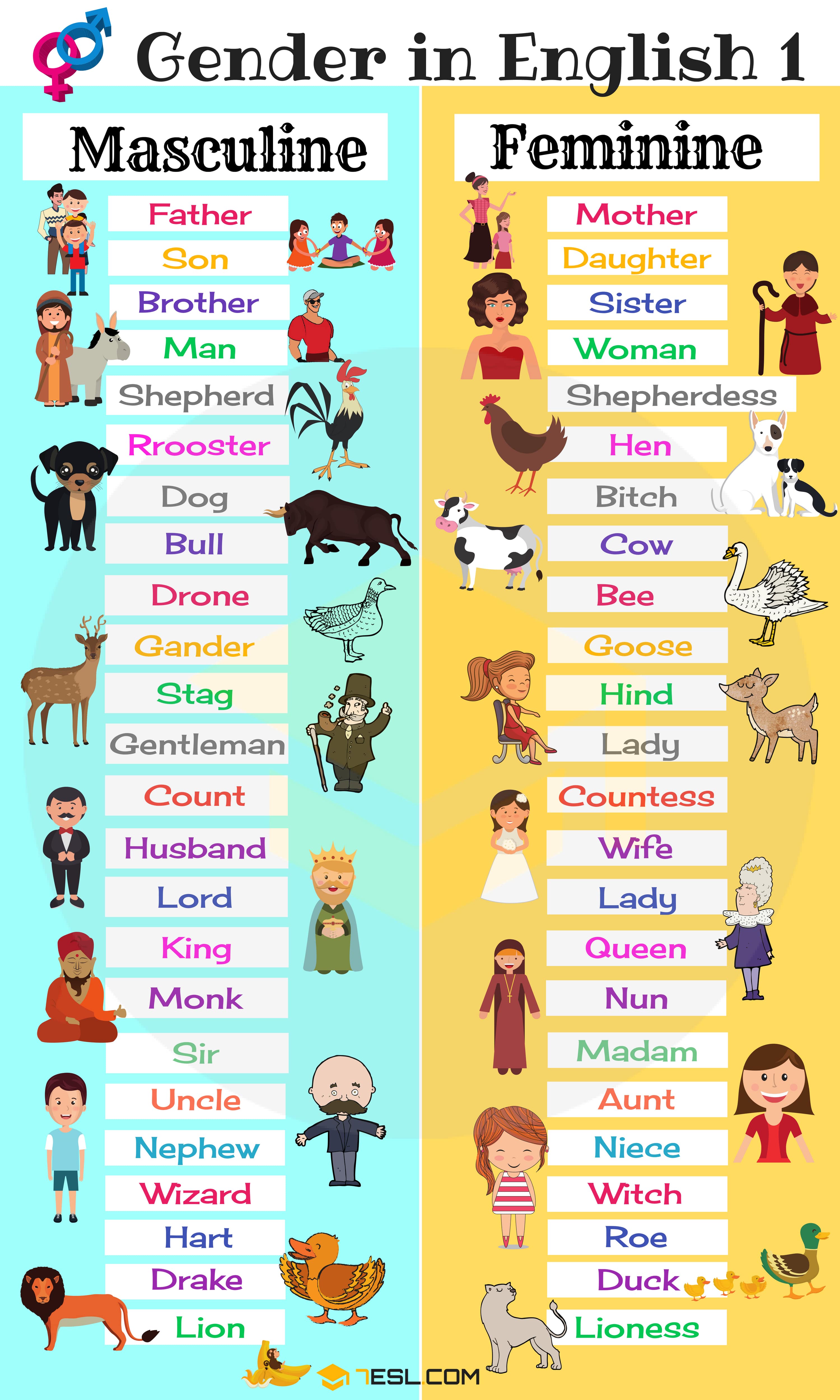




madarchod
ReplyDelete